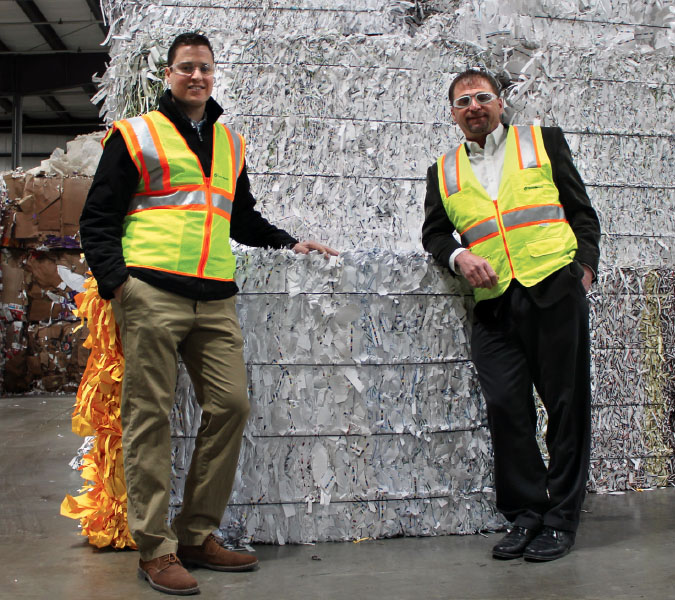
Quincy Recycle General Manager Chad Crawford (left) and Sales Manager Alan Schumacher stand beside some of the large bales of shredded paper fiber ready for shipment to recycling processors at the company’s facility in Marion. PHOTO DAVE DEWITTE
By Dave DeWitte
dave@corridorbusiness.com
Recycling companies have been swimming upstream for much of the last year, but for Quincy Recycle, which entered the Corridor market two years ago, the tough industry conditions are just another creative challenge.
Quincy Recycle contracts with waste generators to take recyclable paper, cardboard and plastic, which it then markets to companies that recycle the materials. The privately owned firm opened its sixth Midwestern recycling facility in the fall of 2016 at 6281 N. Gateway Drive in Marion, and recently expanded to a two-shift recycling operation.
Entering the market against well-entrenched competition, Quincy Recycle has positioned itself as a problem-solver. Because it specializes in recycling and is not part of a large diversified waste company, “we can be more creative in our solutions,” Quincy Recycle General Manager Chad Crawford said.
That’s more important than ever, because the price of recyclables has plunged since July 2017, as the cost of transporting them has trended sharply higher.
The reason lies half a world away. The United States had been exporting about one-third of its recyclables to other countries, and China was the largest single importer, leveraging its abundant supply of inexpensive labor to sort mixed materials by hand.
In the middle of last year, however, China announced it was banning many imports of recyclable scrap, including mixed-paper, effective Dec. 31, 2017, due to concerns that it contained too much non-recyclable garbage and even toxic waste. The country also imposed a 0.5 percent contaminants limit on imported recyclables which went into effect March 1, 2018, and issued other specifications for incoming recyclables that were more stringent than the global norm.
Prices for recyclable cardboard, paper and some types of plastic in the United States immediately slumped. One of the most valuable commodities, cardboard, fell from $160 to $80 per ton.
“They were receiving a lot of garbage [in the mixed waste],” said Alan Schumacher, a recycling industry veteran and sales manager for Quincy Recycle. “It’s made somewhat of a glut in materials in the United States.”
As the market for most recyclable materials has slumped, the cost of shipping them has increased. Mr. Crawford said Quincy Recycle has kept a close eye on shipping costs because of that trend, which is due partly to a new federal requirement for electronic logging of driver hours and partly to a shortage of truck drivers.
Quincy Recycle is now working to open new markets for its recyclables by expanding its relationships with domestic buyers of recyclable fiber. Mr. Schumacher believes the price collapse will have the greatest impact on municipal recycling programs that use single-stream recycling, because much of the material is no longer purchased by Chinese buyers.
In fact, some cities like Grinnell are already shifting emphasis from maximizing recycling to reducing waste generation at the household level because of the reduced value of the materials.
In the market of large-volume generators of recyclables that can separate them at the source, Mr. Schumacher still sees plenty of opportunity.
“With large industrial customers, I think it’s still gathering steam,” Mr. Schumacher said. “We have large corporations here in Eastern Iowa that are close to becoming zero-landfill, not only with solid matter, but waste foods and food byproducts.”
Becoming a zero-waste company is a badge of honor that many companies would like to wear as it provides a valuable sales tool for customers and prospective employees. That makes it worthwhile for waste generators to invest time and equipment into creating an efficient system for separating, storing and shipping recyclables with Quincy Recycle’s help.
“We find solutions for companies,” Mr. Crawford said. “We start the relationship by going in and saying, ‘How can we create another revenue stream for you?’”
The process typically requires a walk-through of the customer’s facility to learn more about the waste stream and how it’s being processed. Sometimes materials are already being recycled, but Quincy Recycle can identify ways to improve the material flow so that it requires less work and floor space. The end goal is to see if there’s enough recyclable material to make it economically worthwhile to “densify” and market it to a end user.
Even though recycling has been widely embraced, it’s still possible to find some big areas of savings for customers.
“One of them was throwing away eight or 10 tons per month of food scraps,” Mr. Schumacher said. “They didn’t know we had a huge food composter operating in the area, GreenRU.”
A big part of the financial equation that makes recycling worthwhile is the avoided costs of landfill disposal, including landfill tipping fees and hauling charges, Mr. Schumacher said. So even if there’s little or no revenue generated from the food waste itself, finding a customer who will take the waste away at no cost can mean significant savings and provide environmental benefits.
Quincy Recycle is owned by Bryan Stokes of Quincy, Illinois, who acquired the company from his father and has expanded it throughout much of the Midwest. The operation, located in a building near the Marion Police Department that formerly housed Legacy Manufacturing, has 55,000 square feet of space, enough to keep all processing of materials indoors. It employs 12 and serves clients in Iowa and some adjoining states.
Although China’s decision to curtail many imports of recyclables has made for challenging times in the recycling industry, Mr. Crawford and Mr. Schumacher are confident that the market will recover, as new uses for recyclable materials and better ways of efficiently sorting them are implemented. One Eastern Iowa company, Lafarge, is using plastic fiber as a supplement to coal in the kilns it uses to produce cement at its plant near Davenport
“Long-term, with our company it’s going to be a benefit,” Mr. Crawford said. “We find solutions for customers – that’s what we do.”




